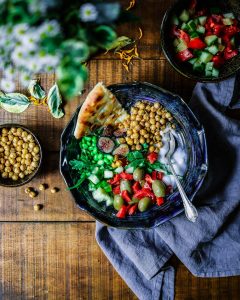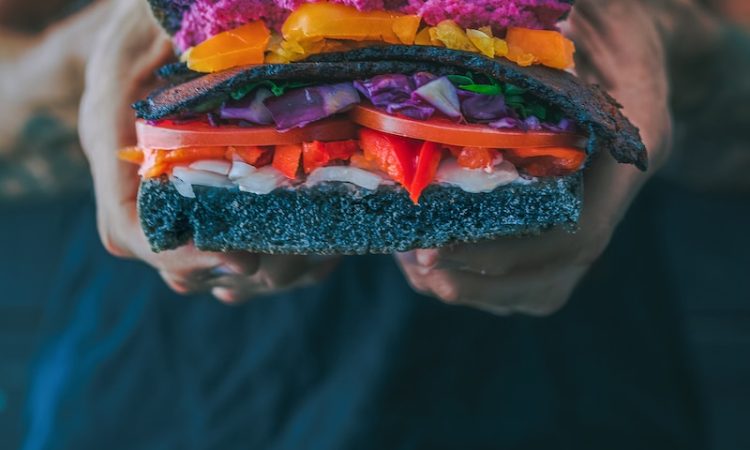From Meat-Free Mondays to Everyday Veganism: How to Maintain a Balanced Plant-Based Diet
Welcome to the era of plant-powered eating! As more and more individuals embrace a compassionate lifestyle, veganism has skyrocketed in popularity. From celebrities and athletes to everyday folks, people are discovering the incredible benefits of adopting a plant-based diet. Whether you’re already committed to Meat-Free Mondays or considering diving headfirst into the world of veganism, this blog post is here to guide you on your journey towards maintaining a balanced and fulfilling plant-based lifestyle. So grab your forks and get ready to explore the ins and outs of going vegan – it’s time for some serious food for thought!
Why More and More People are Ditching Meat
People are ditching meat for a multitude of reasons, and it’s not just about the health benefits. While improving personal well-being is certainly a motivating factor, many individuals are also driven by ethical concerns surrounding animal welfare. The realization that animals raised for food endure immense suffering in factory farms has prompted an increasing number of people to opt for a cruelty-free lifestyle.
Environmental sustainability plays another pivotal role in the decision to go meat-free. Livestock agriculture is one of the leading contributors to greenhouse gas emissions, deforestation, and water pollution. By reducing or eliminating their consumption of animal products, individuals can make a significant impact on mitigating climate change and preserving our planet’s precious resources.
Moreover, more options than ever before exist for those seeking plant-based alternatives that replicate the flavors and textures once associated exclusively with meat dishes. Innovative companies have developed mouthwatering plant-based burgers, sausages, and even seafood substitutes that provide both satisfaction and sustainability.
The rise of social media has also played a crucial role in spreading awareness about veganism. With influencers sharing delicious recipes and highlighting the positive aspects of embracing this lifestyle choice, curiosity is piqued among followers who may have never considered going vegan before.
It seems that as knowledge spreads regarding the benefits of adopting a plant-based diet – whether related to health concerns or broader ethical considerations – more individuals are drawn towards leaving behind old eating habits centered around animal products. In doing so, they embark on an exciting journey towards discovering new flavors while making choices aligned with their values – choices that embrace compassion for animals and contribute positively toward building a healthier future for ourselves and our planet.

The Different Types of Veganism
The Different Types of Veganism
When it comes to veganism, there isn’t just one size fits all. In fact, there are various types of vegan diets that people follow based on their own personal beliefs and preferences. Let’s take a closer look at some of these different variations.
One common type is the dietary vegan. This individual focuses solely on eliminating animal products from their diet. They avoid meat, dairy, eggs, and honey, instead opting for plant-based alternatives like tofu, almond milk, and agave nectar.
Then we have ethical vegans who not only abstain from consuming animal products but also refuse to use any items derived from animals such as leather or wool. For them, veganism extends beyond what they eat; it’s a lifestyle centered around compassion for all living beings.
Another category is the environmentalist vegans who adopt a plant-based diet primarily for sustainability reasons. They recognize the detrimental impact that industrialized animal agriculture has on our planet and choose to make a positive change through their food choices.
There are health-focused vegans who prioritize their well-being by following a whole-foods plant-based diet. These individuals focus on eating nutrient-rich fruits, vegetables, legumes, nuts, and seeds while minimizing processed foods.
It’s important to note that each type of veganism has its unique benefits and challenges. What works best for one person may not work for another due to factors like personal values or nutritional needs.
In conclusion (not concluding), understanding the different types of veganism allows us to appreciate the diversity within this movement and cater our own approach accordingly.
Pros and Cons of a Vegan Diet
Pros and Cons of a Vegan Diet
A vegan diet, which excludes all animal products, has been gaining popularity in recent years. Many people are making the switch for various reasons, such as ethical concerns about animal welfare and environmental sustainability. However, like any diet, there are both pros and cons to consider.
One of the major benefits of a vegan diet is its positive impact on health. Plant-based foods are rich in vitamins, minerals, and antioxidants that promote overall well-being. Research shows that vegans tend to have lower cholesterol levels, reduced risk of heart disease, and lower rates of obesity compared to meat-eaters.
Another advantage is the potential weight loss associated with a vegan lifestyle. Since plant-based diets tend to be low in calories and high in fiber, they can help individuals achieve or maintain a healthy weight. Additionally, studies suggest that vegans may have better blood sugar control due to their higher intake of whole grains and legumes.
Furthermore, adopting a vegan diet can also benefit the environment by reducing greenhouse gas emissions and deforestation caused by livestock farming. It takes less land and resources to produce plant-based foods compared to raising animals for meat consumption.
However, it is important to acknowledge some potential drawbacks as well. One challenge people may face when following a vegan diet is ensuring adequate nutrient intake. Key nutrients like vitamin B12 (found primarily in animal products) may require supplementation or careful planning through fortified foods.
Additionally, adhering strictly to a vegan lifestyle can sometimes be socially challenging or inconvenient when dining out or attending events where non-vegan options dominate the menu choices.
In conclusion,
While there are clear advantages associated with adopting a vegan diet – improved health outcomes and reduced environmental impact – it’s essential for individuals considering this dietary choice weigh up both sides before making any changes.
What Foods to Eat on a Vegan Diet?
When following a vegan diet, it’s important to ensure that you’re getting all the essential nutrients your body needs. Luckily, there are plenty of delicious plant-based foods that can help you meet your nutritional requirements.
Focus on incorporating a variety of fruits and vegetables into your meals. These nutrient-rich foods provide vitamins, minerals, and antioxidants. Leafy greens like spinach and kale are particularly beneficial for their high iron and calcium content.
Next, make sure you’re including sources of protein in your diet. Legumes such as beans, lentils, and chickpeas are excellent options. They not only provide protein but also fiber and other essential nutrients.
Whole grains like quinoa, brown rice, and oats should also be included in your daily meals as they offer complex carbohydrates for energy along with important vitamins and minerals.
Don’t forget about healthy fats! Avocados, nuts (such as almonds or walnuts), seeds (like chia or flaxseeds), and olive oil are great sources of unsaturated fats which support brain health.
Don’t neglect fortified foods or supplements to ensure an adequate intake of vitamin B12 – a nutrient commonly found in animal products.
Remember to experiment with different recipes to keep things interesting while meeting your nutritional needs on this exciting plant-based journey!
Vegan Recipes
Vegan Recipes
When it comes to veganism, one of the most common concerns is finding delicious and satisfying recipes that are completely plant-based. But fear not, because the world of vegan cooking is vast and exciting! From hearty soups to delectable desserts, there’s something for everyone in this culinary journey.
Let’s start with breakfast – a meal that sets the tone for your day. How about indulging in some fluffy vegan pancakes topped with fresh berries and maple syrup? Or perhaps a creamy avocado toast sprinkled with crunchy sunflower seeds?
For lunch, you can whip up a vibrant Buddha bowl filled with nutrient-packed ingredients like quinoa, roasted vegetables, chickpeas, and drizzled with a zesty tahini dressing. Craving something heartier? A comforting lentil curry served over fragrant basmati rice will do the trick.
Dinner options are endless too. You can savor a mouthwatering mushroom risotto or dive into a plate of spicy tofu stir-fry loaded with colorful veggies. And when it comes to dessert, there are countless ways to satisfy your sweet tooth – from rich chocolate avocado mousse to luscious berry crumbles.
The best part about vegan recipes is their versatility. You can easily adapt traditional dishes by swapping out animal products for plant-based alternatives without sacrificing taste or texture. So whether you’re craving comfort food or exploring new flavors, rest assured that vegan recipes have got you covered!
Incorporating more plant-based meals into your diet not only benefits your health but also contributes to sustainability and animal welfare. So why not embark on this culinary adventure and discover the incredible variety of flavors that await you in the world of vegan cooking?
Alternatives to the Vegan Diet
Alternatives to the Vegan Diet
While a vegan diet has gained popularity in recent years, it may not be suitable for everyone. If you’re considering alternatives to a vegan lifestyle, here are some options worth exploring.
1. Flexitarian: This approach allows you to enjoy the benefits of a plant-based diet while still incorporating small amounts of animal products occasionally. It can provide flexibility and make the transition easier for those who find it challenging to give up meat entirely.
2. Vegetarian: Going vegetarian means excluding meat and seafood from your meals but still consuming dairy products and eggs. This choice can offer similar health benefits as a vegan diet while allowing for more variety in food choices.
3. Pescatarian: As a pescatarian, you eliminate all types of meat but include fish and other seafood in your diet. This option can be appealing if you’re looking for additional protein sources without completely giving up animal products.
4. Mediterranean Diet: Inspired by traditional eating habits in countries like Greece and Italy, this diet focuses on whole foods such as fruits, vegetables, whole grains, legumes, nuts, seeds, olive oil, and moderate amounts of fish or poultry.
5. Plant-Based with occasional animal products: You can adopt a primarily plant-based diet that includes occasional consumption of high-quality animal products sourced from ethical and sustainable farming practices.
Remember that each alternative comes with its own unique set of considerations regarding nutrition and environmental impact. It’s essential to do thorough research before making any dietary changes to ensure they align with your personal values and health goals.
Conclusion
Conclusion:
In a world where sustainability and health are becoming increasingly important, it’s no wonder that veganism is on the rise. From Meat-Free Mondays to everyday veganism, more and more people are embracing a plant-based lifestyle for various reasons.
Whether motivated by ethical concerns for animal welfare, environmental awareness, or personal health goals, the decision to adopt a vegan diet is a significant one. It requires careful consideration and planning to ensure that all nutrient needs are met. But with the right knowledge and resources, maintaining a balanced plant-based diet can be both fulfilling and rewarding.
By exploring different types of veganism such as whole-foods plant-based or raw food diets, individuals have the opportunity to find an approach that suits their preferences and aligns with their values. Experimenting with diverse flavors from fruits, vegetables, legumes, grains, nuts, seeds,and other plant-based sources opens up a world of culinary possibilities.
While there are numerous benefits associated with adopting a vegan lifestyle -such as reduced risk of chronic diseases like heart disease and type 2 diabetes- it’s crucial to acknowledge potential challenges as well. Some may struggle with meeting certain nutrient requirements like vitamin B12 or iron without proper supplementation or careful meal planning.
However,the availability of fortified foods,supplements,and increased awareness has made it easier than ever before to maintain optimal nutrition while following a vegan diet.
Key staples in any balanced vegan diet include protein-rich foods like tofu,lentils,chickpeas,and quinoa; healthy fats from avocados,nuts,and seeds; calcium sources such as leafy greens,tofu,tahini;and omega-3 fatty acids found in chia seeds,hempseeds,walnuts,and flaxseeds.
Additionally,a varied intake of colorful fruits and vegetables provides essential vitamins,minerals,and antioxidants necessary for overall well-being.
To help you on your journey towards everyday veganism,following some simple yet delicious recipes can be a great starting point. From creamy vegan mac and cheese to hearty

